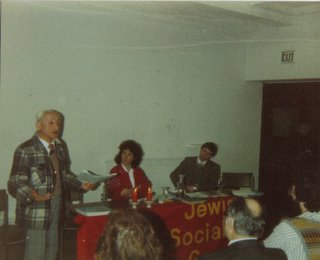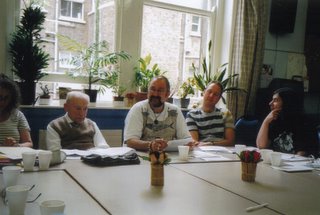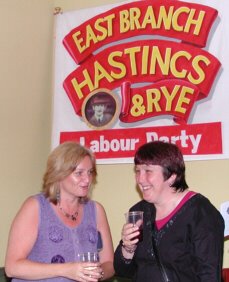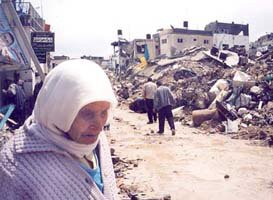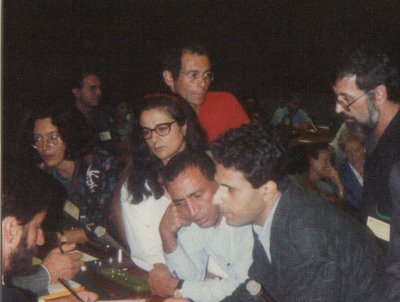Don't Ask the Rabbi!
"Private Eye" once carried a little story saying ex-Liverpool council leader Derek Hatton, of Militant Tendency fame, had managed to place a niece and/nephew in a private fee-paying school, to wit the King David school in Liverpool.
Where do they get these stories? The tales people tell sometimes tell you more about the teller than the person they are supposed to be about. I can imagine someone telling this one while stroking the side of their nose and nudge-nudge,wink-wink, "King David, you know what I mean..."
The then head of Liverpool's biggest Jewish school, Clive Lawton, wrote to the "Eye" pointing out that his school was neither private not fee-paying, but in the state sector. He said that he had been unable to find any little Hattons in the school's registers, but added that of course they would be as welcome as any other kids if their family wished to send them there.
I can't see Rabbi Chaim Simons being happy with that.
Rabbi Simons hails from Edgware,and nowadays lives in Kiryat Arba, the settlement overshadowing Hebron, established by Gush Emunim (religious Zionists) with the help of the Israeli army. From there he shares his views with us whether Baruch Goldstein massacred innocent people in their mosque, and how Arabs should be "transferred" from Palestine. But back in the 1970s Rabbi Simons was employed to impart his wisdom to pupils at Liverpool's King David, and he recounts his exploits as: .
"My Fight for Yiddishkeit:
Reminiscences of a Director of Jewish Studies at the King David High School, Liverpool, in the 1970s"
http://www.geocities.com/CapitolHill/Senate/7854/liverpool.html
To his horor, the Rabbi discovered that King David was accepting children of "mixed marriages", or whose mothers had only been converted to Judaism in Reform or Liberal synagogues, or who could not prove their Jewishness to his Orthodox satisfaction. What was worse, the King David's headmaster insisted that such children could be taught "Jewish Studies" and should not even be segregated at the back of the class, as someone proposed. (and there we were thinking the "ghetto benches" were a reprehensible feature of pre-war Poland).
Let Rabbi Simons explain:
"There were two major problems in the school’s accepting these pupils as Jews. The more serious was that other people, including pupils of the school, would think they were Jews. This could even lead to intermarriage. Only, when a few weeks before the intended marriage, they applied to the Chief Rabbi’s Office for a marriage license, would they discover that their intended partner was in fact non-Jewish. At that stage it would require great strength of character to break off the relationship. In fact, whilst I was at the school, a potential case like this arose. One boy had a girl-friend who was registered in the school as Jewish but in fact was non-Jewish. I called this boy into my study and told him that this girl was non-Jewish.
The second problem is whether it is permissible to teach non-Jews Torah. There is much Religious literature on this question. Many authorities allow the teaching of Bible to non-Jews but forbid teaching the Oral Law. However, even teaching non-Jews the Oral Law is permitted on an occasional basis and is also permitted if it could be dangerous if one did not teach them.
However, these problems should not need to arise in a Jewish School. They should only accept pupils who are Jewish according to Halachah. In a school which needs to take in non-Jewish pupils to make up the numbers required by the Local Education Authority, they should only take non-Jews who will not claim they are Jewish. With such pupils there can be no confusion".
Rabbi Simons knew his duty. He not only went over the Head to report to the rabbinical authorities, and seek backing, and to the Zionist Federation Educational Trust (ZFET; note the way a political organisation has acquired authority in schools).
The rabbi interrogated schoolchildren about their parents, and what synagogue their father attended, he examined Jewish marriage certificates (ketuvot), in one case having to ask for a document to be translated from Arabic by a Liverpool University scholar (just because Rabbi Simons lives in a settlement surrounded by Arabs doesn't mean he must learn their language - he seeks their "transfer" elsewhere, remember)
Where he had to teach a class containing those he did not consider Jews, he contrived to ignore such students, refused them Bar Mitzvah tuition, refused to assist one lad with his tefilim (worn by males when saying the morning prayer) and made sure the others in the class knew why their fellows were singled out. That was not all.
"In the top streams in each year, the pupils learned more Oral Law, and even before the Beth Din ruling, I would "arrange it" that none of these pupils could be in a top stream. Usually this could easily be done, since such pupils were generally uninterested in Jewish Studies. Occasionally they were interested in Jewish Studies but they were still not put in a top stream. On no occasion did a pupil or even his parents make a fuss about this. There was one occasion when the Headmaster asked me why one of these pupils was in the top stream for Modern Hebrew but in a lower stream for Jewish Studies. I explained that this pupil was good at languages but had no interest in Religious Knowledge!
A problem did in fact arise in putting such a pupil in a lower stream, whereas had he been Jewish would have been in the top stream. When it came to the examinations at the end of the year, he might well come top in his class. It was traditional that the top pupil would be presented with a prize at the annual speech day. I felt it would be very wrong for such a pupil to receive a prize for Jewish Studies. I therefore did some "mark manipulation." The Jewish pupil who had the highest mark would have his marks raised, whereas this non-Jewish pupil would have his mark lowered. In this way, a Jewish pupil would have the highest mark in his stream and would thus receive the prize. I felt this manipulation to be perfectly legitimate, since this non-Jewish pupil was not entitled to be in any Jewish Studies class. If he had been awarded the prize, he would have deprived a Jewish pupil from receiving it.
Such courage! Such ingenuity! Had the good rabbi been a non-Jewish teacher applying his methods to, say, Jews or other minorities he would surely have been promoted and decorated for his fight - in South Africa or Nazi Germany say. The head who opposed him would have been sacked and probably incarcerated somewhere. But though Israel may have its racialism, against Palestinians and some Jewish communities, it is far too liberal and secular for a man like Rabbi Chaim Simons. Still, while trying to turn Israeli Occupation and settlement of "Judea and Samaria" into settler domnation over Israel, as well as Palestine, such stalwarts can practice in some British schools.
People may say that nasty a piece of work as this Rabbi may be, he is just one man, and no more typical than say, the racists and antisemites who occasionally crop up teaching in our schools. We remember Ray Honeyford, the Bradford head who expressed his views on racial superiority in right-wing publications, and was eventually removed after a big campaign, in which my late comrade Reuben Goldberg, then a local Labour councillor, took part along with Asian youth.
Let me say that looking back, though I never attended a Jewish school, but went to ordinary state schools and cheder (pre-Barmitzvah claases), two of my favourite teachers were Rabbis, who so far as I was aware, taught fairly and well. I have also known two young rabbis who were good members of the Jewish Socialists' Group, though they were not Orthodox, and whether Rabbi Simons would have accepted them as Rabbis, or even Jews, I very much doubt. Both had to return to the United States, anyway. I know one of them had tried to get suitable employment in this country, and would have been a good teacher. But though we hear about a shortage of such qualified people, there were suddenly no openings when my rabbi friend applied. Could that be anything to do with his political views or the company he chose?
So was, or is, Rabbi Chaim Simons unique, or could he claim backing from those in authority in the schools? "What was the situation at other Jewish schools? I asked several of the Jewish schools in England about their policy in this matter. The JFS in London wrote in their prospectus that the school was open to anyone 'recognised as Jewish by the London Board of Jewish Religious Education.' This London Board (which administers the school together with ZFET) is part of the United Synagogue, whose religious head is the Chief Rabbi. Thus the JFS only takes in pupils Halachically Jewish. The Head of Jewish Studies there told me that they make a check on the Jewishness of each pupil that applies. The Headmaster of the Avigdor Primary School in London asks to see the Ketuvah of any parents he doesn’t know personally. In doubtful cases he asks the Rabbi of the school for his ruling. When I inquired what is meant by doubtful cases, I was told people coming from abroad".
Here's an item from the "Totally Jewish" website:
Sagal's Status Not Recognised
by Justin Cohen - Friday 8th of July 2005
The Chief Rabbi this week ruled he could not recognise the mother at the centre of the controversial JFS conversion case as Jewish.
Helen Sagal was told of the decision during a 90-minute meeting with Sir Jonathan Sacks on Tuesday, three months after she appealed to him over concerns raised by the London Beth Din over the legitimacy of her Israeli conversion, 15 years ago.
In a statement, the Chief Rabbi stated Mrs Sagal had been unable to provide evidence that when she went through the process in 1990 she "maintained even the most basic observance of Jewish law essential to the validity of a conversion." The ruling, which means Mrs Sagal’s son Guy will not be able to attend JFS this September, follows an earlier meeting between her, Sir Jonathan and members of the Beth Din last month. A spokesman for Sir Jonathan’s office said: "The focus of the Chief Rabbi and Beth Din was the lady’s state of mind, her level of acceptance and understanding of mitzvot at time of the conversion."
http://www.totallyjewish.com/news/national/?content_id=1064
And to bring the story up to date:
From the Hendon and Finchley Times, November 16.
Convert's daughter turned away
A Finchley schoolgirl has been refused entry to a Jewish school because the Chief Rabbi does not recognise her mother who is a senior teacher at the school as being Jewish.The girl's parents, David and Kate Lightman, of Grosvenor Road, were married in 1988 after Mrs Lightman spent two years in Israel converting to Judaism, yet the United Synagogue does not recognise her conversion as sincere.In their eyes, her 11-year-old daughter is not Jewish, and therefore cannot attend Jews' Free School (JFS) in Kenton. Mr Lightman said: "We are being persecuted for no reason. We are just a family trying to get on with our lives."The London Beth Din (LBD), the Chief Rabbi's religious court, has rejected Mrs Lightman's conversion and the family's appeals against the decision. Judaism expert Professor Geoffrey Alderman, who attended a meeting with the Lightmans and the LBD, said: "The Lightman case is extraordinary. The Chief Rabbi has intepreted the situation perversely. The Lightmans were married by an orthodox rabbi in New York and Mrs Lightman's conversion is recognised by the Chief Rabbi of Israel."JFS have said they will accept the Lightmans' daughter, but only if Mrs Lightman's conversion is recognised. Mrs Lightman holds the senior teaching position of Head of English at the school, and has in the past taught a number of religious education classes.Mr Lightman said: "They JFS have behaved in an exemplary manner. Kate has had a lot of support at work."A spokesman for the London Beth Din (LBD) said Mr and Mrs Lightman were told of the decision in 1991, but nothing more was heard from them until this year, after appeals for their daughter's admission to Jewish schools had been heard. "No relevant new facts were brought to the attention of the Beth Din, who have reiterated that they are not able to recognise Mrs Lightman's conversion," he said.
Should this be of political concern? Well, we might well want to look critically at the government's policy on "faith schools" (an issue on which some people on the Left have softened considerably as they court religious allies), and ask whether discriminatory practices and indoctrination should be tolerated in schools recognised and subsidised by the state. Not to mention the way this government is happily shifting education from local authorities to private interests that, regardless of their prejudices, can do, and teach, as they please.
As for parents who, without necessarily being all that religious, think faith schools are good for their kids, or would simply like them to learn something of their own tradition, which is fair enough, perhaps they should ask whether Jewish schools which employ the likes of Rabbi Simons and his rules are the way? According to my Bible, a woman called Ruth, a Moabite, once said "Thy people shall be my people, and thy God my God" (or "my G-d" if you prefer), marrying a man call Boaz. Now according to Halacha, Jewish religious custom, descent is traced from the Mother's side. And though the Book of Ruth makes no mention of anyone checking Ruth's ketuba, or what school her son Obed went to, it goes on to say he was father to Jesse, father of David - that is who became King David, and has given his name to schools, though he might not have been accepted in the JFS.
Labels: Jewish, Merseyside, religion, schools
